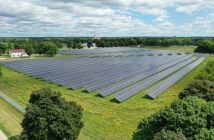Opinion
- A research paper by Pravesh et al entitled Waste to energy through biogas to improve energy security and to transform Africa’s energy landscape, highlights the enormous opportunities by the energy sector to address waste management problems.
- However, the challenges facing the African biogas sector and biogas entrepreneurs is a result of lack of government intervention in setting up market structures to enable growth of this job-enabling sector.
Currently, 80% of households in Africa, cook with traditional fuels, such as fire wood or charcoal. This practice consumes up to half of the households’ incomes. These fuels also significantly contribute to greenhouse gas emissions, deforestation and soil erosion, loss of soil fertility, and leads to severe indoor air pollution with premature death of about four million people worldwide annually.
Most governments in Africa are yet to provide the requisite incentives that would stimulate demand for biogas technologies. Perhaps there are lessons to borrow from China, which have been successful due to the government providing policy support, favourable social-economic conditions and availability of technology. China had about 43 million household biogas users and 10,000 large scale projects by 2016.
In Africa, biogas entrepreneurs require working capital including subsidies to roll out their biogas projects. With most of the expenses paid up-front, it does affect consumer decisions as to whether they will install bio-digesters. Also, providing access to off-grid households could be limited to the fact that the households must have sufficient feedstock for the digester such as animal waste, food waste and crop residue.
Hence, bottling of biogas has been suggested as an option for making energy accessible to individual households from biogas production facilities at large-scale. Using cylinders that can be distributed to homes in the same way as liquefied petroleum gas (LPG).
Khainza Energy Gas, a finalist of the 2018 Royal Academy for Engineering – Africa, has been able to implement this by adopting an innovative circular business approach. The company obtains organic wastes from small-holder farms and local households for processing and refining it into high purity methane. The biogas is then packaged into recyclable biogas cylinders distributed to consumers.
Khainza Energy Gas’ CEO, Arthur Woniala, remarked on the company’s success in providing low-cost cooking fuel solutions to low income Ugandans and creating jobs for suppliers, employees and customers. Woniala said it has been difficult for them in accessing financing to scale production and distribution of recyclable biogas cylinders. “There is a lot of commercial interest in bottling biogas in Uganda, although the traction is still low,” he said.
Therefore there is need to address market systems for biogas and provide support to biogas entrepreneurs to enable them to deliver. Energy market analytical tools such as the one developed by Practical Action together with the European Union Energy Initiative-Partnership Dialogue Facility (EUEI-PDF)categorises the market into three areas, mainly (i) market chain; (ii) inputs, services and finance; and (iii) enabling environment.
Using the EUEI-PDF framework, the biogas market value-chain would include owners of biogas digesters, project developers and end users. In terms of inputs, services and finance providers support the market chain, the services are product design, quality control and testing. Financing refers to banking services, loans for businesses and consumers and others i.e. carbon financing.
The enabling environment refers to the policies and regulations including, for example, quality standards, VAT and subsidies, import duties and also awareness of benefits of clean cooking, and financial and economic factors around affordability.
It has been extremely hard for biogas entrepreneurs to tap into carbon financing, which currently seem to have been monopolised by a few entities. Biogas entrepreneurs do not have institutions that could link their companies to the carbon market. The information on how producers and distributors of biogas could participate is very limited.
However, there is hope that the biogas market will eventually develop since there is still much potential for biogas production and its use at various scales using various levels of technology. This is because biogas entrepreneurs are developing ingenious ways to make biogas attractive and affordable to consumers. A good example is a company in Mogadishu, Jiko Biogas, which is converting fiberglass water tanks into mobile biogas digesters, a transition from cement build biogas plants to other digester technology designs that are more financially feasible for households.
The Chairman of Jiko Biogas and CEO of Power Off-grid, Guled Wiliq, has expressed similar challenges facing biogas entrepreneurs in Africa. Wiliq has plans to establish a sub-Saharan African Association of Biogas Entrepreneurs ranging from Ethiopia, Eritrea, Djibouti, Uganda, Somalia and Kenya. He believes through such efforts, it will create a platform to lobby for their own customized plans/solutions to their challenges .Without creation of a sustainable business environment to minimize some of the risks posed to private business actors,market oriented approaches will be difficult to sustain.
”At the moment we want to create partnerships with governments and other private actors to develop carbon trading in Africa,” said Wiliq. Carbon trading, if operationalised in Africa, will act as an incentive for companies to reduce their greenhouse gas emissions while providing funding to drive projects.
The usage of local innovations and locally-based materials will create sustainable employment for locals. In instances where there are sources of international financing, it would encourage micro financing institutions/banks to come up with financial products that are affordable to consumers. This will require consumers to make monthly payments, after which the life of the loan could be extended to a number of years due to the smaller amount required to finance the project.
Addressing local challenges, Jiko Biogas has adopted an innovative business model in Jowhar, Somalia, where they provide free biogas to Internally Displaced Persons (IDPs). The only requirement of the recipient is the collection of dung to be used in the bio-digester. The company also uses their labour to produce improved cook stoves that are multipurpose and can be used with biogas, charcoal and firewood at the same time. IDPs are required to sell the cook-stoves and slurry fertiliser, creating a win-win situation. Jiko Biogas is currently working to scale biogas solutions in Somalia by converting the resource into electricity via bio-grid.
Therefore considering the transition from biomass to cleaner sustainable fuels, the business gives ideas on how the problem should be addressed to benefit the local population while creating employment. For instance, in Somalia the United Nations Development Programme (UNDP) distributes free imported LPG, Briquite charcoal and improved cook-stoves to IDPs and hosting communities. Whereas, through the Jiko Biogas subsidising route, locally produced affordable improved cook stoves, organic fertilisers and biogas are positioned as an alternative sustainable job creation for IDPs to become self-reliant.
It calls for biogas entrepreneurs to work together to popularise support for the uptake of biogas new technology and provide essential services such as rendering sustained information and educational campaign to create societal demand. India is one example that has managed to increase the levels of uptake of biogas technology by boosting users’ knowledge and expertise.
The potential for biogas and bioenergy production in Africa is huge and there is considerable opportunity for the participation of more investors. However, it is pivotal that government provides market and economic incentives and regulations over design, implementation and quality of biogas systems.
Access the Waste to energy through biogas to improve energy security and to transform Africa’s energy landscape research paper.
Author: Albert Mbaka.
This article was originally published on ESI Africa and is republished with permission with minor editorial changes.
Disclaimer: The articles expressed in this publication are those of the authors. They do not purport to reflect the opinions or views of Green Building Africa, our staff or our advertisers. The designations employed in this publication and the presentation of material therein do not imply the expression of any opinion whatsoever on the part Green Building Africa concerning the legal status of any country, area or territory or of its authorities.











